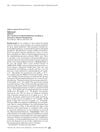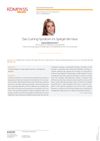 2 citations,
October 2022 in “Journal of Biomedical Science”
2 citations,
October 2022 in “Journal of Biomedical Science” Stem cells and their secretions could potentially treat stress-induced hair loss, but more human trials are needed.
 November 2022 in “Journal of the Endocrine Society”
November 2022 in “Journal of the Endocrine Society” Long-term treatment with buprenorphine/naloxone for opioid addiction may lead to secondary adrenal insufficiency.
 1 citations,
September 2020 in “Endocrinology, Diabetes & Metabolism Case Reports”
1 citations,
September 2020 in “Endocrinology, Diabetes & Metabolism Case Reports” The conclusion is that thorough investigation of hypertension and hormonal dysfunctions is important, and there may be a link between these conditions and cancer.
 51 citations,
November 2005 in “Journal of Medical Primatology”
51 citations,
November 2005 in “Journal of Medical Primatology” Alopecia in captive rhesus macaques is affected by season, sex, age, housing, and stress, with complex links between stress hormones and hair loss.

The case shows the difficulty in diagnosing certain conditions when standard tests are negative.
 10 citations,
December 2015 in “Clinics in Dermatology”
10 citations,
December 2015 in “Clinics in Dermatology” Diabetes can lead to blindness and skin problems, and managing blood sugar and blood pressure is crucial to prevent these complications.
 January 2018 in “Karger Kompass”
January 2018 in “Karger Kompass” Skin symptoms like fragile skin and easy bruising can indicate Cushing's syndrome, which requires early diagnosis and treatment to prevent serious health issues.
 July 2024 in “Occupational Medicine”
July 2024 in “Occupational Medicine” Higher cortisol levels are linked to poor coping, while higher DHEA levels are linked to job confidence.
 6 citations,
February 2017 in “Case Reports in Dermatology”
6 citations,
February 2017 in “Case Reports in Dermatology” Hair loss led to the diagnosis of Cushing's disease in a patient, showing that hair loss can be a sign of hormonal disorders.
 375 citations,
July 2006 in “Journal of Investigative Dermatology”
375 citations,
July 2006 in “Journal of Investigative Dermatology” Stress can worsen skin and hair conditions by affecting the skin's immune response and hormone levels.
 December 2011 in “Korean journal of veterinary research”
December 2011 in “Korean journal of veterinary research” A Miniature Pinscher dog with hair loss and scaling was diagnosed with pattern alopecia and improved with melatonin treatment.
16 citations,
September 1990 in “Fertility and sterility” Ketoconazole can treat ovarian hyperandrogenism but should be used cautiously with monitoring and birth control.
 46 citations,
August 1990 in “The Journal of clinical endocrinology and metabolism/Journal of clinical endocrinology & metabolism”
46 citations,
August 1990 in “The Journal of clinical endocrinology and metabolism/Journal of clinical endocrinology & metabolism” Ketoconazole reduced hair growth and improved acne in women, but caused side effects needing careful monitoring.
 67 citations,
July 2016 in “Reviews in Endocrine and Metabolic Disorders”
67 citations,
July 2016 in “Reviews in Endocrine and Metabolic Disorders” Stress can worsen skin conditions by affecting hormone levels and immune response.
April 2021 in “The journal of heart and lung transplantation/The Journal of heart and lung transplantation” Untreated Sheehan's Syndrome caused severe heart failure in a woman, which improved with hormone and heart failure treatment.
1 citations,
December 2018 in “Veterinary dermatology” The hair coat disorder in Schipperkes is similar to Alopecia X and involves increased androstenedione levels and hair cycle arrest.
 38 citations,
August 2012 in “Biochemical and biophysical research communications”
38 citations,
August 2012 in “Biochemical and biophysical research communications” Human leukocytes and beard hair follicle cells have internal daily clocks, and PER1 and PER3 genes may indicate individual circadian rhythms.
 23 citations,
January 1994 in “Skin Pharmacology and Physiology”
23 citations,
January 1994 in “Skin Pharmacology and Physiology” Hair loss in men and women is linked to high stress hormone levels and other hormonal imbalances, suggesting treatments should be customized to each person's hormones.
 May 2024 in “Journal of clinical case studies reviews & reports”
May 2024 in “Journal of clinical case studies reviews & reports” A man's health improved after treating his undiagnosed adrenal insufficiency, which caused fatigue and weight loss.
3 citations,
February 1992 in “Journal of veterinary medicine. Series A” The farm-raised blue fox had a delayed winter coat cycle and abnormal hormone levels, but its hair growth and hormone changes were still linked.
August 2006 in “Experimental dermatology” Human scalp hair follicles can produce and respond to several hormones, affecting hair growth and pigmentation.
18 citations,
October 1978 in “The journal of investigative dermatology/Journal of investigative dermatology” Excess vitamin A causes lasting gland changes in mouse hair follicles.
 5 citations,
October 2021 in “Signal Transduction and Targeted Therapy”
5 citations,
October 2021 in “Signal Transduction and Targeted Therapy” Stress hormone corticosterone suppresses hair growth by affecting stem cell activity and Gas6 protein expression.
1 citations,
May 2021 in “Journal of the Endocrine Society” A woman developed Cushing syndrome and adrenal insufficiency from using fluticasone and ritonavir together.
September 2021 in “Yearbook of pediatric endocrinology” Stress hormone stops a growth signal and keeps hair stem cells inactive, reducing hair growth.
 49 citations,
April 2016 in “International journal of molecular sciences”
49 citations,
April 2016 in “International journal of molecular sciences” Shift nurses show altered body temperature and stress hormone levels, suggesting their body clocks adjust to irregular schedules.
 2 citations,
October 1999 in “Annals of the New York Academy of Sciences”
2 citations,
October 1999 in “Annals of the New York Academy of Sciences” Melatonin and cortisol affect mink winter hair growth, but β-endorphin levels do not.
 December 2024 in “International Journal Of Ayurvedic And Herbal Medicine”
December 2024 in “International Journal Of Ayurvedic And Herbal Medicine” Shirodhara improves scalp health, hair growth, and skin appearance by reducing stress and enhancing circulation.
 1 citations,
September 2017 in “Journal of Investigative Dermatology”
1 citations,
September 2017 in “Journal of Investigative Dermatology” Blocking a specific enzyme can reduce the negative impact of stress hormones on hair growth cells.
103 citations,
December 2021 in “Journal of biological rhythms” Shift work disrupts the body's natural clock, leading to health problems.





















